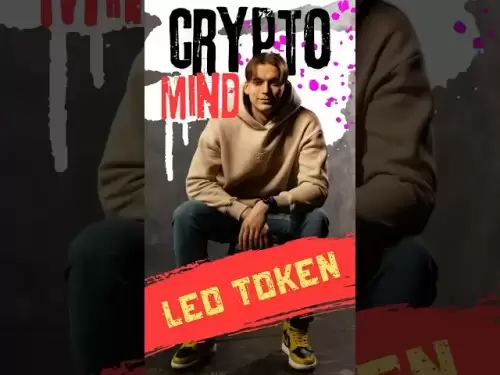 |
|
 |
|
 |
|
 |
|
 |
|
 |
|
 |
|
 |
|
 |
|
 |
|
 |
|
 |
|
 |
|
 |
|
 |
|
Cryptocurrency News Articles
Decentralized Finance Took Center Stage in Washington as the SEC's Latest Policy Roundtable Spotlighted Code-Driven Innovation
Jun 12, 2025 at 09:30 am
Decentralized finance took center stage in Washington as the SEC's latest policy roundtable spotlighted code-driven innovation, individual empowerment

The U.S. Securities and Exchange Commission (SEC) is placing the potential of decentralized finance (DeFi) at the heart of its policy thinking, aiming to balance innovation with investor protection.
At the final session of the Crypto Task Force’s Spring Sprint roundtable series on June 9, SEC Commissioner Hester Peirce spoke about how DeFi aligns with core U.S. values. The event, titled "DeFi and the American Spirit," marked the culmination of a months-long initiative focused on major regulatory themes in crypto, including custody, tokenization, and trading.
The sessions, moderated by former SEC Commissioner Troy Paredes, were instrumental in shaping ongoing SEC policy discussions around digital assets, said Peirce, who is known for her advocacy of crypto regulation.
DeFi, a term used to describe decentralized financial applications on blockchains, has been a subject of debate within the SEC. Some commissioners, including Peirce, see it as an innovation that could create new markets and services, while others have expressed concerns about potential regulatory arbitrage and the need for centralized oversight.
The Build Back Better Act, passed by Congress in 2021, tasked the SEC with studying the implications of DeFi and issuing a report within 180 days. The report, released in March, concluded that DeFi presents both opportunities and risks, and that the SEC’s existing authorities are sufficient to oversee this emerging domain.
During the session, Peirce differentiated DeFi from traditional platforms, highlighting that it's not a service provided and controlled by intermediaries, but rather a system where users interact directly with open-source protocols.
"DeFi is not a place people go to access services that someone else provides and controls; it is software code that people use to engage in the activity of transacting without a centralized intermediary," explained Peirce.
The commissioner also emphasized the constitutional protections for those who write and publish such code. "The SEC must not infringe on First Amendment rights by regulating someone who merely publishes code on the basis that others use that code to carry out activity that the SEC has traditionally regulated," she stated.
"If somebody else subsequently violates the law using the software protocol, the user—not the developer of the software—should face the music," added Peirce.
In her remarks, Peirce used the term "DeFi-In-Name-Only (DINO)" to warn against deceptive efforts to brand centralized services as DeFi.
"We should be wary of efforts to expand the scope of SEC regulation to encompass the activity of software developers or users in a manner that does not closely align with the SEC’s traditional regulatory role or serve the best interests of investors," said Peirce.
The commissioner maintained that the SEC’s efforts are best spent protecting investors "from the providers of financial services, rather than from their own use of open-source software code to engage in transactions with their peers, or from the writers of such code."
In the same vein, Paredes highlighted the importance of focusing on clear threats to investors amid the hype surrounding new technologies.
"We need to be mindful of the SEC’s limited resources and ensure that our regulatory efforts are concentrated on the actors and activities that pose the most significant risks to investors," said Paredes.
The session’s participants discussed the implications of applying traditional financial regulatory frameworks in the context of DeFi. A key theme was the need for a balanced approach that preserves individual rights while ensuring legitimate regulatory oversight of centralized actors.
Disclaimer:info@kdj.com
The information provided is not trading advice. kdj.com does not assume any responsibility for any investments made based on the information provided in this article. Cryptocurrencies are highly volatile and it is highly recommended that you invest with caution after thorough research!
If you believe that the content used on this website infringes your copyright, please contact us immediately (info@kdj.com) and we will delete it promptly.
-

- SBTs (Soulbound Tokens): The Next Phase of Decentralized Identity
- Jun 14, 2025 at 08:40 pm
- Web3 has already changed the way that finance is approached over the last few years, through innovations like smart contracts, DeFi, crypto, and blockchain consensus mechanisms. However, one major component has been missing from all of this: identity.
-

-

-

-

-

- Sam Altman-backed World project officially launches in six U.S. states, allowing users to claim WLD tokens by scanning their irises
- Jun 14, 2025 at 08:30 pm
- It also plans to launch a card in partnership with Visa. According to the project’s official announcement on April 30, the Sam Altman-backed project is finally making its debut in the United States.
-

- The rarest 50p coin design has been crowned - and there's one tiny detail missing on the most sought-after version
- Jun 14, 2025 at 08:25 pm
- Coin collectors have been urged to look out for a 50p design that has been crowned the "rarest in the UK" - and there's one tiny detail missing on the most sought-after version.
-

-






























































